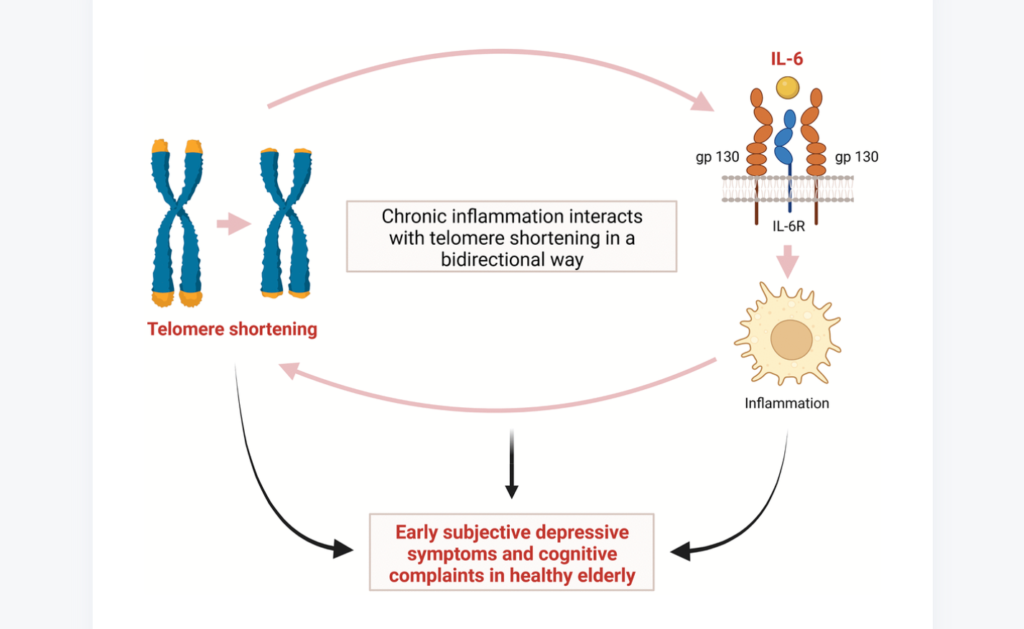“[…] we believe that our findings will help prevent and treat depression and cognitive impairment in the healthy elderly.”
BUFFALO, NY- February 28, 2023 – A new research paper was published on the cover of Aging (listed as “Aging (Albany NY)” by Medline/PubMed and “Aging-US” by Web of Science) Volume 15, Issue 4, entitled, “Relationship between telomere shortening and early subjective depressive symptoms and cognitive complaints in older adults.”
Telomere length (TL) has been reported to be associated with depression and cognitive impairment in elderly. Early detection of depression and cognitive impairment is important to delay disease progression. Therefore, in this new study, researchers Myung-Hoon Han, Eun-Hye Lee2, Hyun-Hee Park, Seong Hye Choi, and Seong-Ho Koh from Hanyang University and Inha University aimed to identify whether TL is associated with early subjective depressive symptoms and cognitive complaints among healthy elderly subjects.
“Several hypotheses have been proposed to explain the emergence of a prematurely aged phenotype in late-life depression, such as glucocorticoid cascade dysregulation, increased allostatic load, and telomere shortening [10, 12].”
This study was a multicenter, outcome assessor-blinded, 24-week, randomized controlled trial (RCT). Measurement of questionnaire and physical activity scores and blood sample analyses were performed at baseline and after six months of follow-up in all study participants. Linear regression analyses were performed to identify whether early subjective depressive symptoms, cognitive complaints, and several blood biomarkers are associated with TL.
Altogether, 137 relatively healthy elderly individuals (60–79 years old) were enrolled in this prospective RCT. The team observed an approximate decrease of 0.06 and 0.11−0.14 kbps of TL per one point increase in the geriatric depression scale and cognitive complaint interview scores, respectively, at baseline and after six months of follow-up. They also found an approximate decrease of 0.08−0.09 kbps of TL per one point increase in interleukin (IL)-6 levels at baseline and after six months of follow-up.
“In conclusion, we showed that both early subjective depressive symptoms and cognitive complaints in relatively healthy elderly individuals were associated with a relatively shorter TL in the randomized controlled prospective SUPERBRAIN study. In addition, a shorter TL was associated with increased IL-6 levels in our study participants. We believe that IL-6, an inflammatory cytokine, plays an important role in the relationship of shortening TL with early subjective depressive mood and cognitive complaints. Although the results will need to be verified through a large-scale RCT in the future, we believe that our findings will help prevent and treat depression and cognitive impairment in the healthy elderly.”
DOI: https://doi.org/10.18632/aging.204533
Corresponding Authors: Seong Hye Choi, Seong-Ho Koh – [email protected], [email protected]
Keywords: telomere length, cognitive complaint, depressive symptom, interleukin-6, aging
Sign up for free Altmetric alerts about this article: https://aging.altmetric.com/details/email_updates?id=10.18632%2Faging.204533
AGING (AGING-US) VIDEOS: YouTube | LabTube | Aging-US.com
About Aging-US:
Launched in 2009, Aging (Aging-US) publishes papers of general interest and biological significance in all fields of aging research and age-related diseases, including cancer—and now, with a special focus on COVID-19 vulnerability as an age-dependent syndrome. Topics in Aging go beyond traditional gerontology, including, but not limited to, cellular and molecular biology, human age-related diseases, pathology in model organisms, signal transduction pathways (e.g., p53, sirtuins, and PI-3K/AKT/mTOR, among others), and approaches to modulating these signaling pathways.
Please visit our website at www.Aging-US.com and connect with us:
For media inquiries, please contact [email protected].
